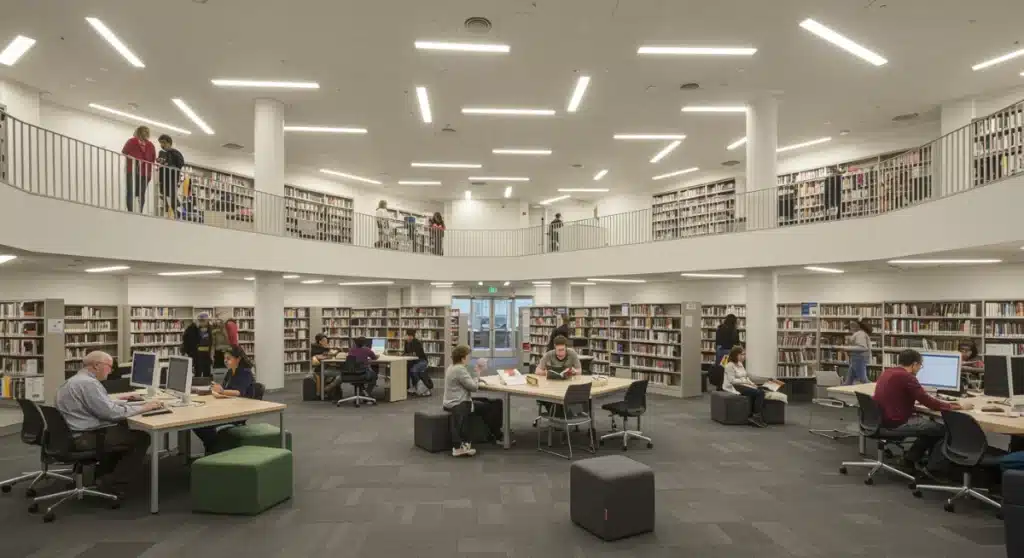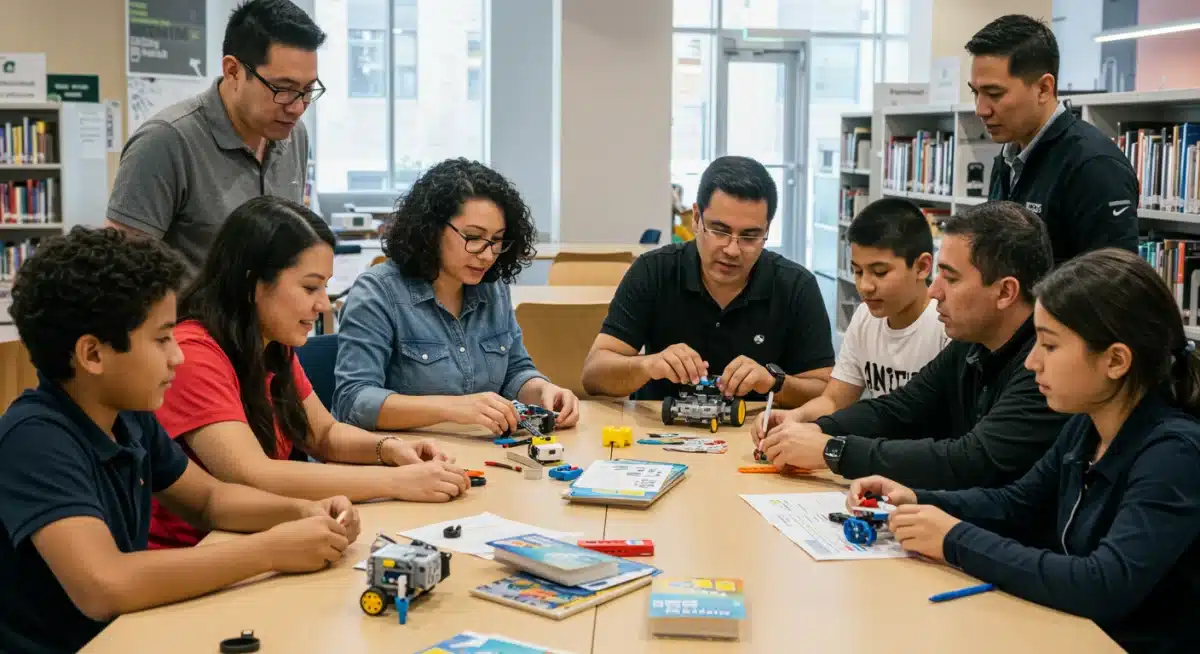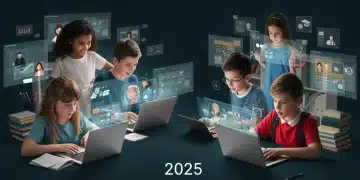Leveraging Public Libraries: 2025 Guide to Free Educational Programs

Public libraries in 2025 are pivotal in offering free educational programs across all age groups, providing substantial financial relief and fostering community intellectual growth. These initiatives are transforming access to learning opportunities.
In an era where educational costs continue to rise, the role of public libraries as beacons of free learning has never been more critical.
Leveraging Public Libraries: A 2025 Guide to Free Educational Programs for All Ages (FINANCIAL IMPACT)
is not just a concept but a tangible reality, offering invaluable resources that ease financial burdens and empower communities.
How are these institutions evolving to meet the demands of a rapidly changing educational landscape?
The Evolving Role of Public Libraries in 2025
Public libraries are no longer just repositories for books; they have transformed into dynamic community hubs,
offering a vast array of free educational programs designed for every demographic.
This evolution is particularly evident in 2025, where digital literacy, workforce development, and early childhood education
are at the forefront of their offerings. These institutions are bridging critical gaps in access to knowledge and skills.
The shift reflects a broader understanding of libraries’ potential beyond traditional services.
They now serve as essential infrastructure for lifelong learning, providing resources that would otherwise be costly.
This expanded role directly contributes to the financial well-being of individuals and families,
making education accessible without the burden of tuition fees or subscription costs.
Digital Inclusion and Literacy Initiatives
A significant focus for public libraries in 2025 is ensuring digital equity.
Many individuals still lack access to reliable internet or the skills to navigate the digital world effectively.
Libraries are stepping up to provide free computer access, Wi-Fi hotspots, and comprehensive training programs.
- Basic Computer Skills: Courses covering operating systems, word processing, and email for beginners.
- Internet Safety Workshops: Educating users on cybersecurity, privacy, and recognizing online threats.
- Coding and Programming: Introductory classes for both youth and adults interested in technology careers.
- Software Proficiency: Training on popular software applications relevant to job markets.
Financial Impact: Saving Thousands on Education
The financial savings realized by individuals and families who utilize public library educational programs are substantial.
From free tutoring to professional development courses, these offerings circumvent the need for expensive private services or online subscriptions.
In 2025, as living costs continue to rise, these free resources represent a critical safety net and opportunity for advancement.
Consider the cumulative cost of online courses, textbooks, and workshops.
A single professional development certification can cost hundreds, if not thousands, of dollars.
Libraries are now offering similar content, often with certified instructors, at no charge.
This direct financial benefit is a cornerstone of their value proposition in the modern educational landscape.
Cost-Benefit Analysis of Library Programs
An analysis of typical educational expenses versus library offerings reveals significant opportunities for savings.
For instance, a family utilizing library resources for after-school tutoring, summer reading programs, and adult education workshops
could save thousands of dollars annually, redirecting those funds to other essential needs.
- Textbook Access: Interlibrary loan systems and digital subscriptions provide free access to academic materials.
- Test Preparation: Free resources for SAT, ACT, GED, and professional certification exams.
- Language Learning: Access to platforms like Rosetta Stone or Duolingo, typically costing monthly fees.
- Skill-Building Workshops: Courses on budgeting, resume writing, and interview skills, often offered by private consultants at a high cost.
Programs for Early Childhood and K-12 Students
Public libraries are foundational in supporting early childhood development and supplementing K-12 education.
Their programs are meticulously designed to foster a love for reading, enhance literacy skills, and provide academic support,
all while alleviating the financial strain on parents and school systems.
These initiatives are crucial for setting a strong educational foundation from a young age.
From engaging story times that boost pre-reading skills to homework help sessions staffed by qualified volunteers,
libraries offer a diverse range of activities.
They also provide access to educational software and online databases that schools might not always provide,
creating an equitable learning environment for all students regardless of their family’s income.


Enhancing Academic Performance
Libraries often collaborate with local schools to align their programs with curriculum standards,
ensuring that their offerings are not just engaging but also academically relevant.
This partnership strengthens the educational ecosystem and provides students with additional avenues for learning and support.
- Story Time and Literacy Programs: Encouraging early literacy through interactive reading sessions and book distributions.
- Homework Help and Tutoring: Free assistance for students across various subjects, often provided by trained volunteers.
- Summer Reading Challenges: Programs designed to prevent summer learning loss and promote continuous reading.
- STEM Workshops for Youth: Hands-on activities in science, technology, engineering, and mathematics to spark interest in these fields.
Adult Education and Workforce Development
For adults, public libraries serve as vital centers for lifelong learning, career advancement, and personal enrichment.
In 2025, with rapidly changing job markets, the demand for continuous skill development is higher than ever,
and libraries are responding with an impressive array of free courses and resources.
Whether it’s for career changers, those seeking to upskill, or individuals pursuing personal hobbies,
the financial benefit of these programs is immense.
They offer pathways to new opportunities without the prohibitive costs associated with private training providers or higher education.
Career Advancement Resources
Libraries are actively partnering with local businesses and employment agencies to ensure their workforce development programs
are aligned with current industry needs. This proactive approach helps individuals gain relevant skills and increases their employability.
- Resume and Interview Workshops: Practical guidance on creating compelling resumes and mastering interview techniques.
- Job Search Assistance: Access to job boards, career counseling, and networking events.
- Professional Certification Prep: Resources and study groups for various industry-recognized certifications.
- Entrepreneurship Support: Workshops and resources for aspiring business owners, including legal and marketing basics.
Accessibility and Inclusivity: Reaching All Ages and Backgrounds
A cornerstone of the public library mission is to provide equitable access to information and education for everyone, regardless of age, background, or ability.
In 2025, libraries are intensifying their efforts to ensure their educational programs are fully inclusive and accessible to all community members.
This commitment to inclusivity is not just about physical access but also about tailoring content and delivery to diverse needs.
From programs designed for seniors to those for individuals with disabilities,
libraries are implementing innovative strategies to remove barriers to learning.
This includes offering materials in multiple languages, providing assistive technologies,
and creating welcoming environments that encourage participation from all segments of the population.
Tailored Programs for Diverse Communities
Understanding that one size does not fit all, libraries are developing specialized programs that cater to the unique needs
of various community groups. This localized approach ensures relevance and maximizes impact.
- Senior-Specific Tech Training: Classes focused on using smartphones, tablets, and navigating online services safely.
- ESL and Citizenship Classes: Supporting immigrant communities with language acquisition and civic education.
- Programs for Individuals with Disabilities: Adaptive technologies, sensory-friendly spaces, and specialized learning tools.
- Outreach to Underserved Areas: Mobile library services and pop-up learning centers in areas with limited access to resources.
Future Trends and Sustainability of Library Education
Looking ahead, public libraries are poised to continue their pivotal role in education,
adapting to emerging technologies and evolving community needs.
The sustainability of these free educational programs hinges on continued public funding,
innovative partnerships, and the unwavering dedication of library staff and volunteers.
In 2025 and beyond, expect to see an even greater integration of artificial intelligence in personalized learning paths,
expanded virtual programming reaching global audiences, and deeper collaborations with educational institutions and employers.
The financial impact of these efforts will only grow, solidifying libraries as indispensable educational assets.
Innovations in Library Education
Libraries are constantly exploring new methods and technologies to enhance their educational offerings.
This forward-thinking approach ensures they remain relevant and effective in a rapidly changing world.
- AI-Powered Learning Tools: Implementing AI to personalize recommendations and provide adaptive learning experiences.
- Virtual Reality (VR) Educational Experiences: Offering immersive learning environments for subjects like history, science, and arts.
- Micro-Credentialing Programs: Collaborating with platforms to offer short, verifiable certifications for in-demand skills.
- Community Co-Creation of Content: Engaging patrons in developing and delivering educational programs that reflect local interests and expertise.
| Key Program Area | Financial Impact & Benefit |
|---|---|
| Digital Literacy & Tech Training | Saves hundreds on private computer courses, enhances employability, bridges digital divide. |
| Early Childhood & K-12 Support | Eliminates costs for tutoring, summer programs, and educational software, supporting academic success. |
| Adult Education & Workforce Development | Provides free career counseling, skill-building workshops, and certification prep, saving thousands in tuition. |
| Resource Accessibility | Offers free access to books, databases, and language learning tools, avoiding subscription fees and purchase costs. |
Frequently Asked Questions About Library Educational Programs
Public libraries in 2025 offer a wide range of free programs, including digital literacy, coding workshops, early childhood literacy, K-12 homework help, adult education, career development, and language learning. These programs cater to all ages and aim to support lifelong learning and skill acquisition.
By providing free access to resources like textbooks, online courses, tutoring, and professional development workshops, public libraries help individuals save hundreds to thousands of dollars annually. This significantly reduces educational expenses, freeing up funds for other household needs.
Yes, public libraries are committed to inclusivity. They offer programs for seniors, individuals with disabilities, and non-English speakers, often providing materials in multiple languages and utilizing assistive technologies to ensure equitable access to educational opportunities for all community members.
In 2025, libraries are crucial for workforce development, offering free resume writing, interview skills workshops, job search assistance, and professional certification preparation. They help individuals acquire in-demand skills and navigate the modern job market without incurring significant costs.
Libraries are embracing AI-powered learning tools, virtual reality educational experiences, and micro-credentialing programs. They are also expanding virtual programming and fostering community co-creation of content to remain relevant and effective in a rapidly evolving educational landscape.
Impact and Implications
The continued expansion and innovation within public library educational programs signal a profound shift in how communities access and value learning.
As we move further into 2025, the financial relief provided by these free resources will become even more critical,
especially for low-income families and individuals seeking to upskill or reskill.
Policymakers and community leaders must recognize the immense return on investment that public libraries offer,
ensuring sustained funding and support for these vital institutions.
The trajectory indicates libraries will increasingly serve as primary engines for equitable access to education and economic mobility.





